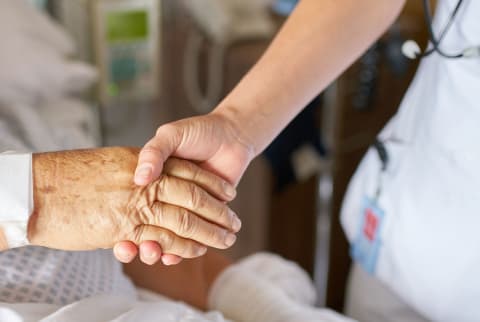Advertisement
8 Things Working With The Dying Has Taught Me About Living A Meaningful Life


As the lead neuropsychologist for an interdisciplinary center for individuals diagnosed with amyotrophic lateral sclerosis (ALS), I have had many therapy clients die over the years. I have always been honored to have the privilege to sit with my clients during such an important part of their lives.
This role has taught me so much about what it takes to have a peaceful death—and in turn, a meaningful life. These top lessons form a blueprint for living in a way you won't regret:
Allow your purpose to change as life goes on
We live in a day and age where the word "purpose" carries so much weight. It's becoming synonymous with finding your one true love—but I've noticed that you don't need to have just one. In your 20s, your purpose may look different than it does in your 30s, and so on and so forth. It's also important to note that none of your purposes have to relate to your career. For many people, they do not.
So, how do you find what your purpose is now? Engaging in a values exercise can be helpful. The objective is to narrow down the list to three to five things that you value most and ask yourself how you can lead your life right now with those in mind.
Give love away freely and unconditionally
The ultimate freedom is loving people without the worry of what they will do with that love. I've found that the more opportunities people have to love and be loved by others, the more at peace they are with their lives in the end. So, do your best to let go of your anger toward those who have "wronged" you, and be as kind and empathetic as you can be.
Begin to see the present moment more often, if not all the time
Most of the sadness that happens at the end of people's lives stems from an attachment to their past. They believe that things should have been different. They then grieve a future they feel they were entitled to receive.
I have learned that bad things happen to the very best people, and it truly is unfair. A way to make peace with that is to be in the moment at every moment possible, with your eyes wide open. Be appreciative of what you have right in front of you right now. Practicing meditation and gratitude can be very helpful for cultivating this present moment awareness.
Do things for other people whenever you can
There is lots of research to show that altruism leads to a happier and more meaningful life1. If you can take the time once a day, once a week, or even once a month to give back to others, it goes a long way.
One small way to do this often is by saying lovingkindness phrases silently to those you pass by. This practice was introduced to me by Sharon Salzberg, a central figure in the field of meditation. Lovingkindness phrases include "May you find peace and happiness," "May you feel lovingkindness," and "May you be free from suffering."
Craft a strong routine of healthy habits
Many people struggle with how to spend their time at the end of life. I often see people who don't have an understanding of how to create a schedule for themselves, who feel bored. Human beings thrive on routines. And oftentimes, routines actually create meaning for many of us.
The happiest people I've seen at the end of life still have calendars filled with travel plans, catchups with friends, and leisure activities. Having a plan is just as important at the beginning of existence as it is at the end. (If you're looking for a way to change your habits, check out my guided journal, 12 Months to Happier Habits.)
Learn to have less attachment to ego
Letting go of ego can mean a few different things, but to me, it entails letting go of attachment to your body or the identities you wear on a daily basis. At any time, an identity or a portion of your body may stop working for you. I recommend finding a variety of activities that do not require physicality so that as you age, you won't be so attached to the Self. Learn to be fluid with your ego.
Tap into your spiritual side
Research demonstrates that those who have a connection to spirituality are less frightened by death and feel life has more meaning. Spirituality does not have to look a particular way. If you have an aversion to organized religion for whatever reason, you may find your connection through meditation or visualization. I've also found that using psychedelics or MDMA (always in a therapeutic setting) can be helpful for connecting to the universe at large.
Have a conversation with yourself about death every day — even if you're young
The most relaxed people I see are not afraid of death. They often see death as just another part of life or even the next big adventure. Saying to yourself daily, "I am going to die someday" will allow you to approach death with less fear and keep you focused on what makes you feel most alive at all times.
The takeaway
Life is such a journey—and its meaning is a little different for everyone. I hope these lessons help you navigate the world with a bit more clarity.
It is never too early (or too late) to change your path to find more purpose. But just remember: The fastest way to find meaning and joy is to be open to the present moment—so relax; you're doing great.